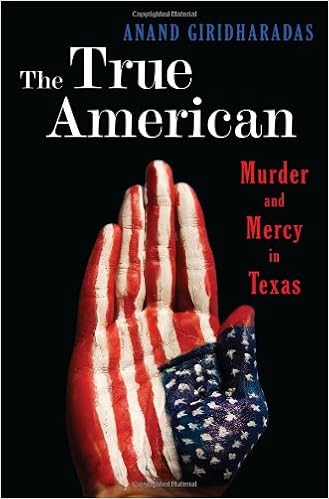-
About
Our Story
back- Our Mission
- Our Leadershio
- Accessibility
- Careers
- Diversity, Equity, Inclusion
- Learning Science
- Sustainability
Our Solutions
back
-
Community
Community
back- Newsroom
- Webinars on Demand
- Digital Community
- The Institute at Macmillan Learning
- English Community
- Psychology Community
- History Community
- Communication Community
- College Success Community
- Economics Community
- Institutional Solutions Community
- Nutrition Community
- Lab Solutions Community
- STEM Community
- Newsroom
Top of My Summer Reading List
- Subscribe to RSS Feed
- Mark as New
- Mark as Read
- Bookmark
- Subscribe
- Printer Friendly Page
- Report Inappropriate Content
I may be the last person in the country to have heard about Anand Giridharadas’s The True American: Murder and Mercy in Texas, but I spotted the striking cover when I was walking through an airport a week or so ago and immediately went over to check it out. The first part of the title caught my attention because for years I had intense discussions with students in my writing classes about how to define an “American.” We’d read what Alexis de Tocqueville had to say by way of defining the people he met when he visited the country in 1831—along with several later attempts at definitions and then eventually our own try at this task. Along the way we were learning about the characteristics of good definitions, but the conversations over this particular definition were always beyond lively, often continuing far after the class discussion closed.
 Of course, the second part of the title is also arresting, so I grabbed the book from the shelf and took it with me onto the plane. The opening is as riveting a piece of writing as I’ve read in quite a while, and it’s based on a true story. It begins ten days after 9/11, when Mark Stroman, a tough guy covered with tattoos, enters a Dallas mini-mart, marches up to the counter, and asks the brown-skinned man behind, “Where are you from?” Raisuddin Bhuiyan, a well-educated immigrant from Bangladesh who has come to the U.S. in pursuit of his own American dream, sees that the man holds a gun and expects a robbery. But the question startles him and before he can find an answer, Stroman shoots him in the face. As he lies in a pool of his own blood, he thinks that if Allah spares his life, he will dedicate what he has left of it to serving others.
Of course, the second part of the title is also arresting, so I grabbed the book from the shelf and took it with me onto the plane. The opening is as riveting a piece of writing as I’ve read in quite a while, and it’s based on a true story. It begins ten days after 9/11, when Mark Stroman, a tough guy covered with tattoos, enters a Dallas mini-mart, marches up to the counter, and asks the brown-skinned man behind, “Where are you from?” Raisuddin Bhuiyan, a well-educated immigrant from Bangladesh who has come to the U.S. in pursuit of his own American dream, sees that the man holds a gun and expects a robbery. But the question startles him and before he can find an answer, Stroman shoots him in the face. As he lies in a pool of his own blood, he thinks that if Allah spares his life, he will dedicate what he has left of it to serving others.
The rest of the book explores the road that brought each man to this particular spot on this particular day, moving back and forth between the two and bringing both into remarkable focus. Bhuiyan doesn’t die, though he loses an eye and has many surgeries. Stroman is caught, tried, and convicted of this and two other assaults, including a death, and sent to death row. So far, a remarkable pairing of stories. But Giridharadas goes far beyond any simple linking of good and evil. With grace and great insight, based on hundreds of hours of interviews with both men and their families, he paints a more and more complex picture of what motivated and continues to motivate each man. Eventually, Bhuiyan not only forgives Stroman but mounts a campaign to save him from the death penalty; Stroman for his part undergoes a transformation that leaves him remorseful—and connected to Bhuiyan in several ways.
I won’t say more because I really hope that teachers everywhere read this book. What I think you will find is a subtly nuanced as well as gripping tale that raises questions about just what a “true American” is and that refuses to provide any simple answers. I can imagine using this book as a key text in a course that invites students to do research on a whole range of issues related to “murder and mercy” and the American psyche. I’m so glad for that chance find in an airport bookshop and for an extremely rewarding summer read. Check it out to see if you agree.
Want to offer feedback, comments, and suggestions on this post? Join the Macmillan Community (it’s free, quick, and easy) to get involved!

